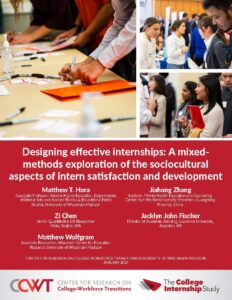Hora, M., Chen, Z., Wolfgram, M., Zhang, J., & John Fischer, J. (2022).  Designing effective internships: A mixed-methods exploration of the sociocultural aspects of intern satisfaction and development. Center for Research on College-Workforce Transitions. University of Wisconsin-Madison.
Designing effective internships: A mixed-methods exploration of the sociocultural aspects of intern satisfaction and development. Center for Research on College-Workforce Transitions. University of Wisconsin-Madison.
Summary: Internships are widely promoted high-impact practices that can have positive impacts on students’ academic and post-graduate success, yet how specific features facilitate these outcomes is understudied. Instead, internships are often studied in terms of mere participation, without recognizing that these experiences are
complex pedagogic spaces shaped by professional cultures and decisions about instructional design. In this sequential mixed-methods study we use sociocultural learning theory to interpret data from online surveys (n=435) and focus groups (n=52) with students at five institutions. Stepwise linear regression analyses of demographic and programmatic variables associated with intern satisfaction, developmental value, and career adaptability indicated that first-generation status, gender, race and income level, and supervisor behaviors were significantly associated with satisfaction and development. Analyses of qualitative data revealed that features of positive (clear communication, availability, feedback) and negative (unavailability, inattention to learning) supervision impacted student experiences. These findings reveal that internships should be designed with careful attention to task scaffolding, student autonomy and supervisor assistance, depending on the professional context and situation. These results highlight the need for colleges and employers to design internships as mentored and culturally shaped learning spaces, provide supervisor training, and consider the cultural backgrounds of students when matching them to internships.
